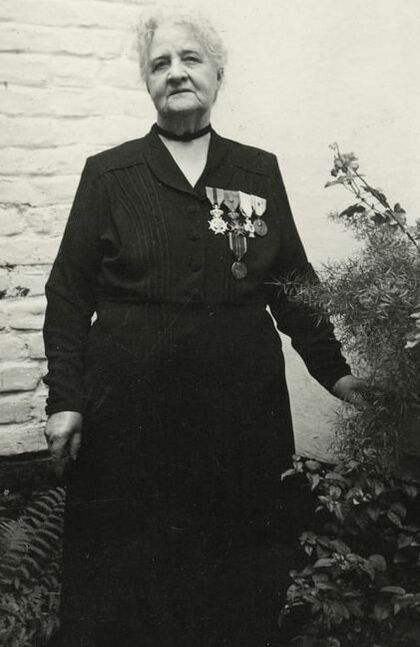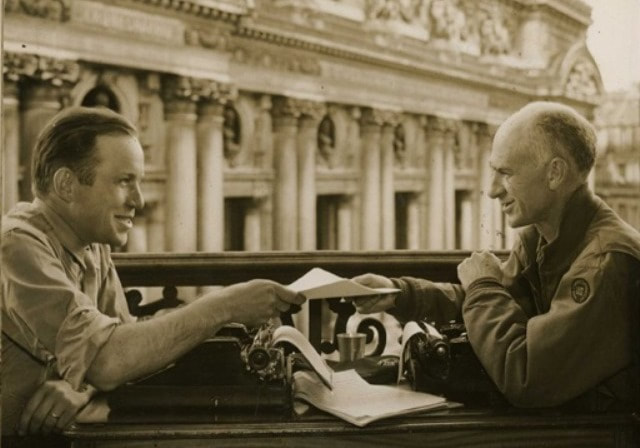 Anna Duchene, Brussels, 1954. Anna Duchene, Brussels, 1954. Hal Boyle’s columns were big wherever the Associated Press was used. He was Everyman, from Kansas City, writing for Middle America, with no political bias and plenty of heart. I knew Boyle, from bowling in the Associated Press league when I was a 16-year-old copyboy. He was a jovial man whom I recall with cigar and perhaps a beer, laughing easily with everybody. He had won a Pulitzer Prize in 1945 – for his coverage of the European war -- but you would never know it. https://www.pulitzer.org/winners/harold-v-hal-boyle Now, as a recovering columnist, I am reading Hal Boyle’s columns. In 1954, he visited my Irish-born grandaunt in Brussels and wrote about the atomization of her family from World War II. (I recently came upon my mother’s cache of photos and clippings of her lost Belgian-Irish relatives.) Decades later, Hal Boyle holds up in hard-cover form; very few columnists do -- Mike Royko, Jimmy Breslin, a few story-tellers, writing about the human condition. Like the best journalists, Boyle has a fine eye for details – the bullet hole in Madame Duchene’s front doorway -- from the day a Scottish soldier she had been hiding bolted from the Gestapo, and was gunned down in the street. (He lived to old age but Madame Duchene’s daughter, Florence, and her son, Leopold, did not.) I cannot access Boyle’s column on line, but I wrote about that family in 2006: https://www.nytimes.com/2006/06/09/sports/soccer/09vecsey.html Boyle paints a portrait of the grandaunt I never met. On the 10th anniversary of following the Allies into Europe, he spent a few hours at her home – get this -- 7, rue Sans-Souci. (Street Without Care) Again, like the best journalists, Boyle is there to observe, to ask questions. His compassion for the old lady with her memories and her medals, surely has roots in his mother’s childhood in poverty-ridden Ireland. I never finished his collection – the aptly-named “Help, Help! Another Day!” – from a poem by Emily Dickinson – but now I am enjoying his changes of pace: communing with the graves of men who died on the Normandy killing beach, or staying in a camp deep in the Catskills, listening to the sounds of night. Perhaps his most poignant column came from defying the third or fourth rule of journalism – never succumb to the cheap device of quoting taxi drivers. But Boyle happened to ride in the cab of a philosopher who was mourning a beloved wife who had died years earlier. The man advised Boyle to cherish his own wife, and life itself, and Boyle was wise and talented enough to make a column out of his encounter. (Boyle’s own wife would die young, and he would follow, from a heart attack, at only 63.) Many great journalists are full of themselves, to the point of grimness, but Boyle was jolly, in a melancholy Irish way. He was as much at home in the camaraderie of a beer frame as he had been with the sights and sounds of combat. One thing I just learned from skimming his columns: his own meter was always running. I am convinced: what I am about to tell you is no coincidence: At that bowling alley – Beacon Lanes, 76th and Amsterdam, second floor – the coat-check was run by a highly loquacious and secure black man, who seemed to have the word “autodidact” glowing proudly like theater lights on his forehead. The man liked to chat about the books and poems he had read – most notably “Thanatopsis,” by William Cullen Bryant, using the Greek word for “consideration of death.” At 16, I looked forward to my weekly chat with the brother. Now, 63 years later, I pick up Hal Boyle’s collection. His latest column is from Jan. 9, 1964, called “Nostalgia Is a Medicine to Cure the Blues,” with one-line observations about things you don’t see much anymore. One of them was: “Anybody with a claim to culture could prove it by reciting aloud the concluding lines of William Cullen Bryant’s “Thanatopsis.” This means, to me, without a doubt, that Hal Boyle, Pulitzer-Prize winning columnist of the Associated Press, had been chatting with the same vibrant coat-check man at the Beacon Lanes in the season of 1955-56. With that discovery, I feel a great kinship with the man who visited my grandaunt in war-ravaged Brussels. I wish I had read more of Hal Boyle, had asked more questions, back in the day. But I did bowl with him.
Mendel
1/10/2019 01:45:46 am
I too once met a columnist. And asked some questions.
Gene Palumbo
1/10/2019 04:14:05 pm
Me too, Mendel.
Mendel
1/11/2019 01:39:41 am
...as if he was more interested in me than I was in him, Gene. Same guy?
Gene Palumbo
1/11/2019 07:07:48 pm
Same guy? Sure sounds like it. He dah man.
bruce
1/11/2019 10:26:20 am
gene/mendel,
George Vecsey
1/14/2019 09:28:44 am
Thanks for comments. The real issue is the questions not asked. I am reminded of that reading letters my mother received after WWII from her Irish-side relatives in Brussels. I knew the very basics, but I think, as the oldest, I tuned out asking more questions about that side of the family, and the brutal impact of the war on them. Lots of elders I did not engage.....but by the time you realize that, you are old. GV
Mendel
1/14/2019 12:48:17 pm
The Passover Seder ritual is based on the premise that tradition is preserved through the asking of questions. "Even one who is alone on Passover night," says a popular teaching, "should ask questions of himself."
Michael Green
1/12/2019 05:10:45 pm
A great piece, and I thought of the tribute to Hal Boyle that is in Lindsey Nelson's autobiography. Nelson was essentially a media relations officer in World War II, and knew all of the greats.
George Vecsey
1/14/2019 09:34:22 am
I did not know Lindsey wrote a book. Another fine person I met. Was lucky to have dinner with him in Knoxville around 1982, only time we ever spent time together other than group gatherings around the Mets. Comments are closed.
|
Categories
All
|










